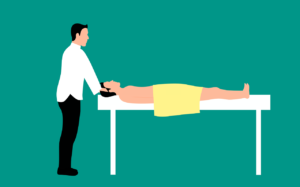
You wake up in the morning feeling refreshed and ready to start your day, but there’s one problem: your shoulder is sore from sleeping on it. Don’t worry, we’ve all been there before. In this article, we’ll discuss some simple yet effective ways to relieve the discomfort in your shoulder so that you can get back to your daily routine without any pain or inconvenience. Whether it’s stretching exercises, applying heat or cold packs, or trying out some soothing massages, we’ve got you covered. So, let’s jump right into these easy and practical solutions to ease your sore shoulder and bring back that much-needed mobility and comfort.
Ways to Relieve a Sore Shoulder from Sleeping on It

Understanding the Causes of Shoulder Pain
Shoulder pain can be a common occurrence, especially when you wake up with a sore shoulder from sleeping on it. Understanding the causes of shoulder pain can help you find effective ways to relieve it. There are several factors that can contribute to shoulder pain, including sleeping in an unfavorable position, rotator cuff injuries, tendonitis or bursitis, arthritis, frozen shoulder syndrome, and other possible causes.
Essential Steps for Immediate Relief
When you wake up with a sore shoulder, it’s important to take immediate steps to alleviate the discomfort. Resting and avoiding overuse is crucial to give your shoulder a chance to heal. Applying ice or cold packs can help reduce inflammation and provide temporary pain relief. Taking over-the-counter pain relievers, such as ibuprofen or acetaminophen, can also help manage the pain. If you prefer topical relief, you can try using over-the-counter anti-inflammatory creams as well.

Applying Heat or Cold Therapy
Heat or cold therapy can be an effective way to relieve shoulder pain. Heat therapy helps increase blood flow to the affected area, promoting relaxation and reducing stiffness. You can use heating pads or hot packs to apply heat to your sore shoulder. Another option is to take warm showers or baths, allowing the warm water to soothe your muscles.
On the other hand, cold therapy can help reduce inflammation and numb pain. Using ice packs or cold compresses can effectively alleviate shoulder soreness. It’s important to note that both heat and cold therapy should be used cautiously and not applied directly to the skin to avoid burns or frostbite. Always wrap the heating pad or ice pack with a towel before placing it on your shoulder.
Practicing Gentle Stretches and Exercises
Gentle stretches and exercises can help relieve shoulder pain and improve flexibility and strength. Range of motion exercises, such as shoulder circles and arm swings, can help loosen up the shoulder joint. The pendulum exercise, where you lean forward and gently swing your arm in circles, can also provide relief. Cross-body stretches, doorway stretches, and standing arm wall crawls are other effective exercises that target the shoulder muscles.
Resistance band exercises can help strengthen the muscles around the shoulder joint, reducing the risk of future pain. These exercises typically involve extending the resistance band and performing various movements to work the shoulder muscles. Remember to start with light resistance and gradually increase it as your strength improves.

Using a Shoulder Support Pillow
A shoulder support pillow can provide proper alignment and support for your shoulder while you sleep. These specialized pillows are designed with a groove or contour that accommodates the shoulder and minimizes pressure points. Choosing the right type of shoulder support pillow is essential for optimal results. Look for a pillow that offers sufficient support and maintains the natural curvature of your spine. Proper positioning and adjusting the pillow can also enhance its effectiveness in relieving shoulder pain.
Adjusting Sleeping Positions
Your sleeping position plays a significant role in determining whether you wake up with a sore shoulder or not. The back sleeping position is generally considered the best for shoulder health as it distributes the weight evenly. If you prefer side sleeping, try to avoid putting direct pressure on your shoulder by placing a pillow between your arms. Stomach sleeping should be avoided as it can cause misalignment and strain on the shoulder joint. Using pillows for additional support can also help alleviate shoulder pain and provide a more comfortable sleep.
Investing in a Quality Mattress and Pillows
The quality of your mattress and pillows can greatly impact your shoulder health. A proper mattress should provide adequate support for your body, including your shoulders, to prevent undue stress and discomfort. Consider choosing a mattress that offers medium-firm support to promote proper alignment and relieve pressure points. Memory foam mattresses are popular for their contouring abilities and can provide excellent shoulder support.
Aside from a quality mattress, using the right pillows is equally important. Pillows for shoulder pain relief should provide proper alignment and support for your head, neck, and shoulders. Ergonomic pillows are designed to conform to the natural curvature of your spine and minimize pressure on the shoulder. Memory foam pillows can also provide excellent support by molding to the shape of your head and shoulders.
Massage and Self-Care Techniques
Massage therapy can be a beneficial way to relieve shoulder pain. Massages help relax the muscles, improve circulation, and reduce inflammation. If you can’t schedule a professional massage, there are self-massage techniques that you can try to alleviate shoulder soreness. You can use your opposite hand to gently knead and massage the affected shoulder, applying light pressure as needed. Foam rolling can also be effective in releasing tension in the shoulder muscles. Using tennis or lacrosse balls against a wall or the floor can help target specific trigger points and provide relief.
Trying Over-the-Counter Pain Medications
Over-the-counter pain medications can be helpful when it comes to managing shoulder pain. Nonsteroidal anti-inflammatory drugs (NSAIDs), such as ibuprofen or naproxen, can help reduce inflammation and alleviate pain. Acetaminophen can also help with pain relief, but it does not have anti-inflammatory properties. It’s important to follow the recommended dosage and consult with a healthcare professional if you have any underlying medical conditions or are taking other medications.
When to Seek Medical Attention
In most cases, shoulder pain from sleeping on it will resolve with at-home remedies and self-care techniques. However, there are instances where medical attention may be necessary. If you experience severe pain that does not improve with rest and over-the-counter medications, or if there is difficulty moving your shoulder or signs of infection, it’s important to consult a healthcare professional. They can conduct a thorough examination, order diagnostic tests if needed, and provide appropriate treatment options based on your specific condition.
In conclusion, relieving a sore shoulder from sleeping on it requires understanding the causes of shoulder pain and implementing various techniques to find relief. Taking essential steps for immediate relief, such as resting, applying ice or cold packs, and using over-the-counter pain relievers, can significantly alleviate discomfort. Heat or cold therapy, gentle stretches and exercises, shoulder support pillows, adjusting sleeping positions, investing in quality mattresses and pillows, massage and self-care techniques, and trying over-the-counter pain medications are all effective strategies to relieve shoulder soreness. However, if the pain persists or worsens, it’s important to seek medical attention to determine the underlying cause and receive appropriate treatment. By understanding and implementing these strategies, you can find relief from a sore shoulder caused by sleeping on it.







